Danny Kaye (1911-1987) was an American actor, singer, dancer, comedian and musician. His performances featured physical comedy, idiosyncratic pantomimes and tongue-twisting songs. Kaye starred in 17 films such as Wonder Man (1945), The Secret Life of Walter Mitty (1947), and White Christmas (1954).
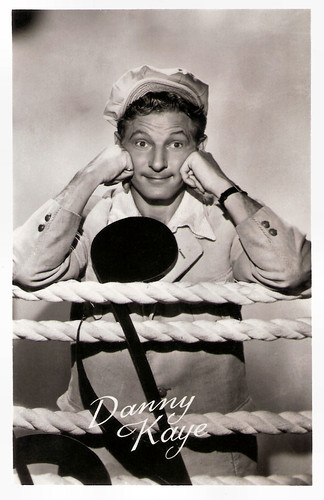
Dutch postcard, no. 3166. Photo: publicity still for The Kid from Brooklyn (Norman Z. McLeod, 1946).

British postcard in the Picturegoer Series, London, no. W 721. Photo: RKO Radio. Publicity still for A Song Is Born (Howard Hawks, 1948).
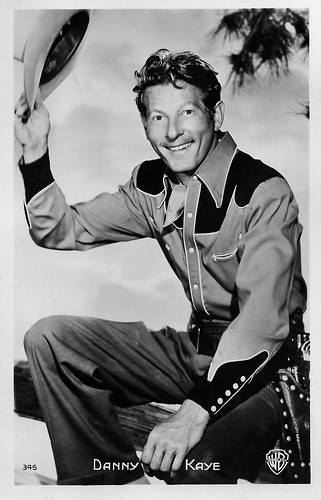
French postcard by Editions P.I., Paris, no. 345. Photo: Warner Bros.
Danny Kaye was born David Daniel Kaminsky in 1911 in Brooklyn, New York. He was the youngest of three sons of Ukrainian Jewish immigrants Jacob and Clara (née Nemerovsky) Kaminsky. Kaye always publicly claimed that he was born in 1913. After his death, daughter Dena revealed that her father's birth certificate indicates that he was born in 1911 and that no one in the family knows why he made this alteration to his age.
At school, Danny began entertaining his classmates with songs and jokes. His mother died when he was in his early teens. Not long after his mother's death, the 13-year-old Kaye and his friend Louis ran away to Florida. Danny sang while Louis played the guitar and the pair eked out a living for a while. Later, after a series of odd jobs, he worked as an entertainer in the so-called Borscht Belt of Jewish resorts in the Catskill Mountains. It was there he learned the basics of show biz.
Kaye's first break came in 1933 when he joined the Three Terpsichoreans, a vaudeville dance act. They opened in Utica, New York, where he used the name Danny Kaye for the first time. The act toured the United States, and then performed in Asia with the show 'La Vie Paree'. In 1935, Danny Kaye made his film debut in the comedy short Moon Over Manhattan (Al Christie, 1935). In 1937 he signed with New York-based Educational Pictures for a series of two-reel comedies. He usually played a manic, dark-haired, fast-talking Russian in these low-budget shorts, opposite young hopefuls June Allyson and Imogene Coca. The Kaye series ended abruptly when the studio shut down in 1938.
In 1939, he made his Broadway debut in 'Straw Hat Revue', a short-lived Broadway show with Sylvia Fine as the pianist, lyricist, and composer. Sylvia discovered that Danny once had worked for her father Samuel Fine, a dentist. In 1940, he married Sylvia Fine, who went on to manage his career. The reviews for the show brought an offer for both Kaye and his bride to work at La Martinique, a New York City nightclub. Kaye performed there with Sylvia as his accompanist.
At La Martinique, playwright Moss Hart saw Danny perform, and that led to Hart casting him as Russell Paxton in the hit Broadway comedy 'Lady in the Dark' (1941), starring Gertrude Lawrence. At age 30, Kaye scored a triumph. His show-stopping number was 'Tchaikovsky' by Kurt Weill and Ira Gershwin in which he sang the names of a string of Russian composers at breakneck speed, seemingly without taking a breath. In the next Broadway season, he was the star of a show about a young man who is drafted called 'Let's Face It!'

Dutch postcard.

German collectors card by Helmstedter Margarinewerk GMBH, Helmstedt. Gift by Didier Hanson.
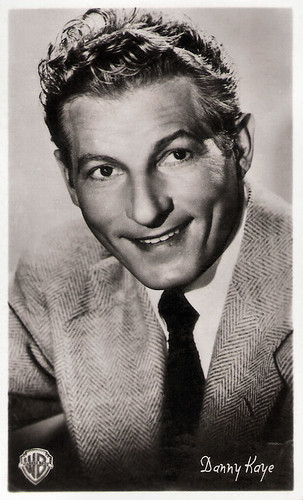
Belgian collectors card by Fotoprim offered by De Beukelaer, Antwerp, no. A 21. Photo: Warner Bros.
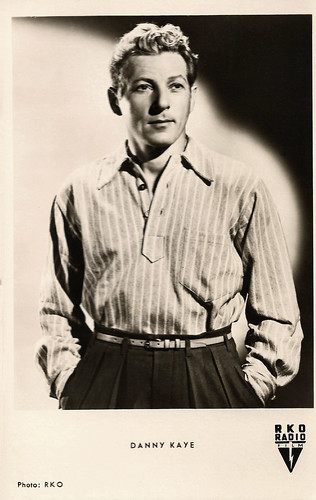
German postcard by Kunst und Bild, no. A 444. Photo: RKO Radio Film. Publicity still for The Secret Life of Walter Mitty (Norman Z. MacLeod, 1947).
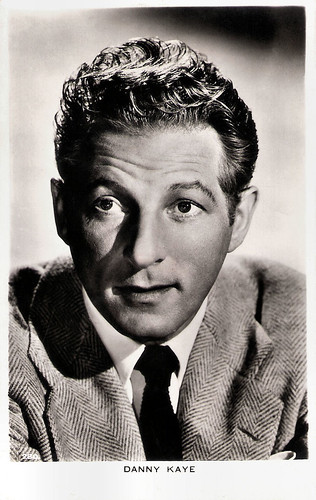
British Real Photograph postcard, no. 280.
Producer Samuel Goldwyn put Danny Kaye in a series of Technicolor musicals. Goldwyn had asked him to get his nose fixed so it would look less Jewish, but Kaye refused. His feature-film debut was in the Technicolor comedy Up in Arms (Elliott Nugent, 1944) with Dinah Shore. It was a remake of Goldwyn's comedy Whoopee! (Thornton Freeland, 1930) with Eddie Cantor. Up in Arms was nominated for two Academy Awards in 1945. With Up in Arms, Kaye Became an international success and rival producer Robert M. Savini cashed in with the patchwork feature The Birth of a Star (William Watson, 1945). He had edited the compilation from three of Kaye's Educational Pictures shorts, Dime a Dance (Al Christie, 1937), Getting an Eyeful (William Watson, 1938) and Cupid Takes a Holiday (William Watson, 1938). In 1945–1946, Kaye starred in a radio program, The Danny Kaye Show, on CBS. The program's popularity rose quickly. Before a year he tied with Jimmy Durante for fifth place in the Radio Daily popularity poll. He went on to do four more pictures in succession with Sam Goldwyn before moving on to Warner Brothers, 20th Century-Fox and Paramount.
For Goldwyn, Kaye played a pair of estranged twins with very similar looks, but very different personalities in the musical Wonder Man (H. Bruce Humberstone, 1945). Then he appeared as a milkman who became a world boxing champion in The Kid from Brooklyn (Norman Z. McLeod, 1946). In both films, Virginia Mayo was his love interest. In the popular hit The Secret Life of Walter Mitty (Norman Z. McLeod, 1947), he played a young daydreaming proofreader (later associate editor) for a magazine publishing firm and Virginia Mayo as the girl of his dreams. Kaye and Mayo co-starred for the fourth and last time for Goldwyn in the Technicolor musical A Song Is Born (Howard Hawks, 1948), with famous musicians such as Benny Goodman, Tommy Dorsey, Louis Armstrong, Lionel Hampton and Charlie Barnet playing themselves. Another success was the Technicolor musical comedy The Inspector General (Henry Koster, 1949) in which Danny Kaye starred opposite Walter Slezak. The film is loosely based on Nikolai Gogol's play The Inspector General, but the plot is re-located from the Russian Empire into an unspecified corrupted region of a country that suddenly finds itself under the supervision of the First French Empire.
Kaye was a liberal Democrat who opposed the Hollywood blacklist. In 1953 Kaye started a production company, Dena Pictures, named for his daughter. The comedy Knock on Wood (Melvin Frank, Norman Panama, 1954), with Mai Zetterling, was the first film produced by his firm. The firm expanded into television in 1960 under the name Belmont Television. In total, Kaye starred in 17 films, including the biopic Hans Christian Andersen (Charles Vidor, 1952) with Farley Granger, White Christmas (Michael Curtiz, 1954) with Bing Crosby, and The Court Jester (Melvin Frank, Norman Panama, 1956) with Glynis Johns. Kaye received a Golden Globe nomination for his role, but the costly The Court Jester bombed at the box office. His final starring role in a film was in The Man from the Diners' Club (Frank Tashlin, 1963).
On TV, he appeared in The Danny Kaye Show (1963–1967). The show won four Emmy awards and a Peabody award. In 1976 he played Mister Geppetto in a television musical adaptation of Pinocchio (Ron Field, Sid Smith, 1976) with Sandy Duncan in the title role. Kaye portrayed Captain Hook opposite Mia Farrow in a musical version of Peter Pan (Dwight Hemion, 1976). He later guest-starred in episodes of The Muppet Show (1978), the revival of Twilight Zone (1985) and The Cosby Show (1986). He played one of his few dramatic roles in Skokie (Herbert Wise, 1981), as a Holocaust survivor protesting a planned march by Neo-Nazis in the predominately Jewish community of Skokie.
He showed his serious side as an ambassador for UNICEF. In 1954, Kaye became the first ambassador-at-large of UNICEF and in 1986, he received the French Legion of Honour for his years of work with the organisation. Before he died in 1987, Kaye conducted an orchestra during a comical series of concerts organised for UNICEF fundraising. Danny Kaye died of heart failure in 1987, brought on by internal bleeding and complications of hepatitis C. In 1983, Kaye had quadruple bypass heart surgery and contracted hepatitis C from a blood transfusion. Kaye was 76. His only child was daughter Dena, born in 1946.
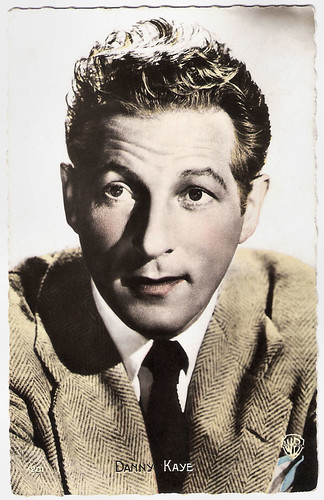
French postcard by Editions P.I., Paris, no. 201. Photo: Warner Bros.
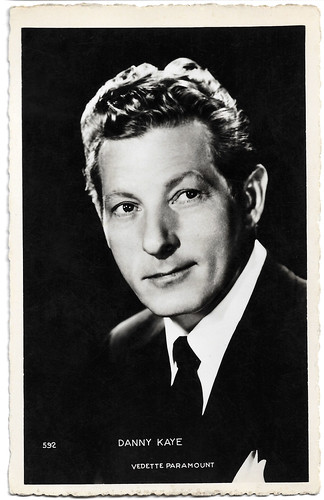
French postcard by Edit. P.I., Paris, no. 592 Photo: Paramount, 1954.

Dutch card. Photo: Warner Bros.
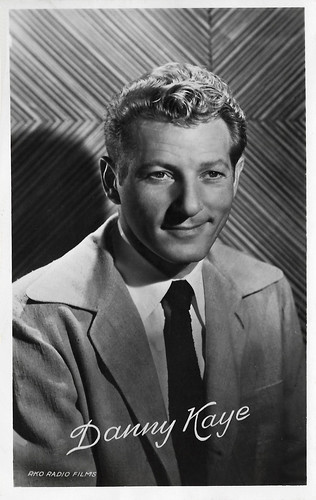
Dutch postcard by Uitg. Takken, Utrecht, no. 3232. Photo: RKO Radio Films.
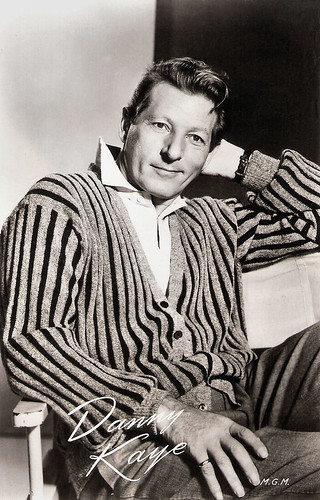
Dutch postcard by Uitg. Takken, Utrecht, no. AX 3869. Photo: M.G.M. Publicity still for Merry Andrew (Michael Kidd, 1958).
Sources: Tony Fontana (IMDb), Wikipedia and IMDb.
This post was last updated on 8 December 2024.

Dutch postcard, no. 3166. Photo: publicity still for The Kid from Brooklyn (Norman Z. McLeod, 1946).

British postcard in the Picturegoer Series, London, no. W 721. Photo: RKO Radio. Publicity still for A Song Is Born (Howard Hawks, 1948).

French postcard by Editions P.I., Paris, no. 345. Photo: Warner Bros.
Singing the names of Russian composers at breakneck speed
Danny Kaye was born David Daniel Kaminsky in 1911 in Brooklyn, New York. He was the youngest of three sons of Ukrainian Jewish immigrants Jacob and Clara (née Nemerovsky) Kaminsky. Kaye always publicly claimed that he was born in 1913. After his death, daughter Dena revealed that her father's birth certificate indicates that he was born in 1911 and that no one in the family knows why he made this alteration to his age.
At school, Danny began entertaining his classmates with songs and jokes. His mother died when he was in his early teens. Not long after his mother's death, the 13-year-old Kaye and his friend Louis ran away to Florida. Danny sang while Louis played the guitar and the pair eked out a living for a while. Later, after a series of odd jobs, he worked as an entertainer in the so-called Borscht Belt of Jewish resorts in the Catskill Mountains. It was there he learned the basics of show biz.
Kaye's first break came in 1933 when he joined the Three Terpsichoreans, a vaudeville dance act. They opened in Utica, New York, where he used the name Danny Kaye for the first time. The act toured the United States, and then performed in Asia with the show 'La Vie Paree'. In 1935, Danny Kaye made his film debut in the comedy short Moon Over Manhattan (Al Christie, 1935). In 1937 he signed with New York-based Educational Pictures for a series of two-reel comedies. He usually played a manic, dark-haired, fast-talking Russian in these low-budget shorts, opposite young hopefuls June Allyson and Imogene Coca. The Kaye series ended abruptly when the studio shut down in 1938.
In 1939, he made his Broadway debut in 'Straw Hat Revue', a short-lived Broadway show with Sylvia Fine as the pianist, lyricist, and composer. Sylvia discovered that Danny once had worked for her father Samuel Fine, a dentist. In 1940, he married Sylvia Fine, who went on to manage his career. The reviews for the show brought an offer for both Kaye and his bride to work at La Martinique, a New York City nightclub. Kaye performed there with Sylvia as his accompanist.
At La Martinique, playwright Moss Hart saw Danny perform, and that led to Hart casting him as Russell Paxton in the hit Broadway comedy 'Lady in the Dark' (1941), starring Gertrude Lawrence. At age 30, Kaye scored a triumph. His show-stopping number was 'Tchaikovsky' by Kurt Weill and Ira Gershwin in which he sang the names of a string of Russian composers at breakneck speed, seemingly without taking a breath. In the next Broadway season, he was the star of a show about a young man who is drafted called 'Let's Face It!'

Dutch postcard.

German collectors card by Helmstedter Margarinewerk GMBH, Helmstedt. Gift by Didier Hanson.

Belgian collectors card by Fotoprim offered by De Beukelaer, Antwerp, no. A 21. Photo: Warner Bros.

German postcard by Kunst und Bild, no. A 444. Photo: RKO Radio Film. Publicity still for The Secret Life of Walter Mitty (Norman Z. MacLeod, 1947).

British Real Photograph postcard, no. 280.
A pair of estranged twins
Producer Samuel Goldwyn put Danny Kaye in a series of Technicolor musicals. Goldwyn had asked him to get his nose fixed so it would look less Jewish, but Kaye refused. His feature-film debut was in the Technicolor comedy Up in Arms (Elliott Nugent, 1944) with Dinah Shore. It was a remake of Goldwyn's comedy Whoopee! (Thornton Freeland, 1930) with Eddie Cantor. Up in Arms was nominated for two Academy Awards in 1945. With Up in Arms, Kaye Became an international success and rival producer Robert M. Savini cashed in with the patchwork feature The Birth of a Star (William Watson, 1945). He had edited the compilation from three of Kaye's Educational Pictures shorts, Dime a Dance (Al Christie, 1937), Getting an Eyeful (William Watson, 1938) and Cupid Takes a Holiday (William Watson, 1938). In 1945–1946, Kaye starred in a radio program, The Danny Kaye Show, on CBS. The program's popularity rose quickly. Before a year he tied with Jimmy Durante for fifth place in the Radio Daily popularity poll. He went on to do four more pictures in succession with Sam Goldwyn before moving on to Warner Brothers, 20th Century-Fox and Paramount.
For Goldwyn, Kaye played a pair of estranged twins with very similar looks, but very different personalities in the musical Wonder Man (H. Bruce Humberstone, 1945). Then he appeared as a milkman who became a world boxing champion in The Kid from Brooklyn (Norman Z. McLeod, 1946). In both films, Virginia Mayo was his love interest. In the popular hit The Secret Life of Walter Mitty (Norman Z. McLeod, 1947), he played a young daydreaming proofreader (later associate editor) for a magazine publishing firm and Virginia Mayo as the girl of his dreams. Kaye and Mayo co-starred for the fourth and last time for Goldwyn in the Technicolor musical A Song Is Born (Howard Hawks, 1948), with famous musicians such as Benny Goodman, Tommy Dorsey, Louis Armstrong, Lionel Hampton and Charlie Barnet playing themselves. Another success was the Technicolor musical comedy The Inspector General (Henry Koster, 1949) in which Danny Kaye starred opposite Walter Slezak. The film is loosely based on Nikolai Gogol's play The Inspector General, but the plot is re-located from the Russian Empire into an unspecified corrupted region of a country that suddenly finds itself under the supervision of the First French Empire.
Kaye was a liberal Democrat who opposed the Hollywood blacklist. In 1953 Kaye started a production company, Dena Pictures, named for his daughter. The comedy Knock on Wood (Melvin Frank, Norman Panama, 1954), with Mai Zetterling, was the first film produced by his firm. The firm expanded into television in 1960 under the name Belmont Television. In total, Kaye starred in 17 films, including the biopic Hans Christian Andersen (Charles Vidor, 1952) with Farley Granger, White Christmas (Michael Curtiz, 1954) with Bing Crosby, and The Court Jester (Melvin Frank, Norman Panama, 1956) with Glynis Johns. Kaye received a Golden Globe nomination for his role, but the costly The Court Jester bombed at the box office. His final starring role in a film was in The Man from the Diners' Club (Frank Tashlin, 1963).
On TV, he appeared in The Danny Kaye Show (1963–1967). The show won four Emmy awards and a Peabody award. In 1976 he played Mister Geppetto in a television musical adaptation of Pinocchio (Ron Field, Sid Smith, 1976) with Sandy Duncan in the title role. Kaye portrayed Captain Hook opposite Mia Farrow in a musical version of Peter Pan (Dwight Hemion, 1976). He later guest-starred in episodes of The Muppet Show (1978), the revival of Twilight Zone (1985) and The Cosby Show (1986). He played one of his few dramatic roles in Skokie (Herbert Wise, 1981), as a Holocaust survivor protesting a planned march by Neo-Nazis in the predominately Jewish community of Skokie.
He showed his serious side as an ambassador for UNICEF. In 1954, Kaye became the first ambassador-at-large of UNICEF and in 1986, he received the French Legion of Honour for his years of work with the organisation. Before he died in 1987, Kaye conducted an orchestra during a comical series of concerts organised for UNICEF fundraising. Danny Kaye died of heart failure in 1987, brought on by internal bleeding and complications of hepatitis C. In 1983, Kaye had quadruple bypass heart surgery and contracted hepatitis C from a blood transfusion. Kaye was 76. His only child was daughter Dena, born in 1946.

French postcard by Editions P.I., Paris, no. 201. Photo: Warner Bros.

French postcard by Edit. P.I., Paris, no. 592 Photo: Paramount, 1954.

Dutch card. Photo: Warner Bros.

Dutch postcard by Uitg. Takken, Utrecht, no. 3232. Photo: RKO Radio Films.

Dutch postcard by Uitg. Takken, Utrecht, no. AX 3869. Photo: M.G.M. Publicity still for Merry Andrew (Michael Kidd, 1958).
Sources: Tony Fontana (IMDb), Wikipedia and IMDb.
This post was last updated on 8 December 2024.
No comments:
Post a Comment